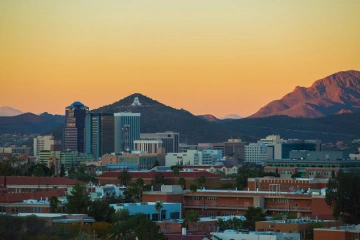Land Acknowledgment
We respectfully acknowledge the University of Arizona is on the land and territories of Indigenous peoples. Today, Arizona is home to 22 federally recognized tribes, with Tucson being home to the O’odham and the Yaqui. The university strives to build sustainable relationships with sovereign Native Nations and Indigenous communities through education offerings, partnerships, and community service.
History
"The University of Arizona's Land Acknowledgment serves as a foundational step toward becoming a leading institution in serving Native American communities. We honor the sovereignty of Native Nations and, together, we are educating the next generation of leaders."
Levi Esquerra, Senior Vice President Native American Advancement & Tribal Engagement
Extension Office Locations
For presentations or displays outside of Tucson, please use the official university written statement above or one of our specific extension and outreach office area written statements below.
Tucson Area
We respectfully acknowledge the University of Arizona is on the land and territories of Indigenous peoples. Today, Arizona is home to 22 federally recognized tribes, with Tucson being home to the O’odham and the Yaqui. The University strives to build sustainable relationships with sovereign Native Nations and Indigenous communities through education offerings, partnerships, and community service.
Phoenix Area
We respectfully acknowledge the University of Arizona is on the land and territories of Indigenous peoples. Today, Arizona is home to 22 federally recognized tribes, with Phoenix being home to the Ak-Chin Indian Community, Fort McDowell Yavapai Nation, Gila River Indian Community, Pascua Yaqui Tribe, Salt River Pima-Maricopa Indian Community and Tohono O’odham Nation. The University strives to build sustainable relationships with sovereign Native Nations and Indigenous communities through education offerings, partnerships, and community service.
Hopi Tribe – Hopi Tribe (Kykotsmovi) Cooperative Extension Office
We respectfully acknowledge the University of Arizona is on the land and territories of Indigenous peoples. Today, Arizona is home to 22 federally recognized tribes, with Kykotsmovi being home to the Hopi Tribe. The University strives to build sustainable relationships with sovereign Native Nations and Indigenous communities through education offerings, partnerships, and community service.
Hualapai Nation – Peach Springs Cooperative Extension Office
We respectfully acknowledge the University of Arizona is on the land and territories of Indigenous peoples. Today, Arizona is home to 22 federally recognized tribes, with Peach Springs being home to the Hualapai Tribe. The University strives to build sustainable relationships with sovereign Native Nations and Indigenous communities through education offerings, partnerships, and community service.
La Paz County/Colorado River Indian Tribes – Parker Cooperative Extension Office
We respectfully acknowledge the University of Arizona is on the land and territories of Indigenous peoples. Today, Arizona is home to 22 federally recognized tribes, with Parker being home to the Colorado River Indian Tribes. The University strives to build sustainable relationships with sovereign Native Nations and Indigenous communities through education offerings, partnerships, and community service.
San Carlos Apache Tribe – San Carlos Cooperative Extension Office
We respectfully acknowledge the University of Arizona is on the land and territories of Indigenous peoples. Today, Arizona is home to 22 federally recognized tribes, with San Carlos being home to the San Carlos Apache Tribe. The University strives to build sustainable relationships with sovereign Native Nations and Indigenous communities through education offerings, partnerships, and community service.
Navajo Nation – Cooperative Extension Offices
We respectfully acknowledge the University of Arizona is on the land and territories of Indigenous peoples. Today, Arizona is home to 22 federally recognized tribes, with Window Rock being home to the Navajo Nation. The University strives to build sustainable relationships with sovereign Native Nations and Indigenous communities through education offerings, partnerships, and community service.
Navajo Nation – Fruitland Cooperative Extension Office
We respectfully acknowledge the University of Arizona is on the land and territories of Indigenous peoples. Today, Arizona is home to 22 federally recognized tribes, with Fruitland being home to the Navajo Nation. The University strives to build sustainable relationships with sovereign Native Nations and Indigenous communities through education offerings, partnerships, and community service.
Navajo Nation – Tuba City Cooperative Extension Office
We respectfully acknowledge the University of Arizona is on the land and territories of Indigenous peoples. Today, Arizona is home to 22 federally recognized tribes, with the Tuba City area being home to the Navajo Nation and the Hopi Tribe. The University strives to build sustainable relationships with sovereign Native Nations and Indigenous communities through education offerings, partnerships, and community service.
We respectfully acknowledge the University of Arizona is on the land and territories of Indigenous peoples. Today, the United States is home to 574 federally recognized tribes, with the DC being home to the Nacotchtank and the Piscataway People. The University strives to build sustainable relationships with sovereign Native Nations and Indigenous communities through education offerings, partnerships, and community service.
